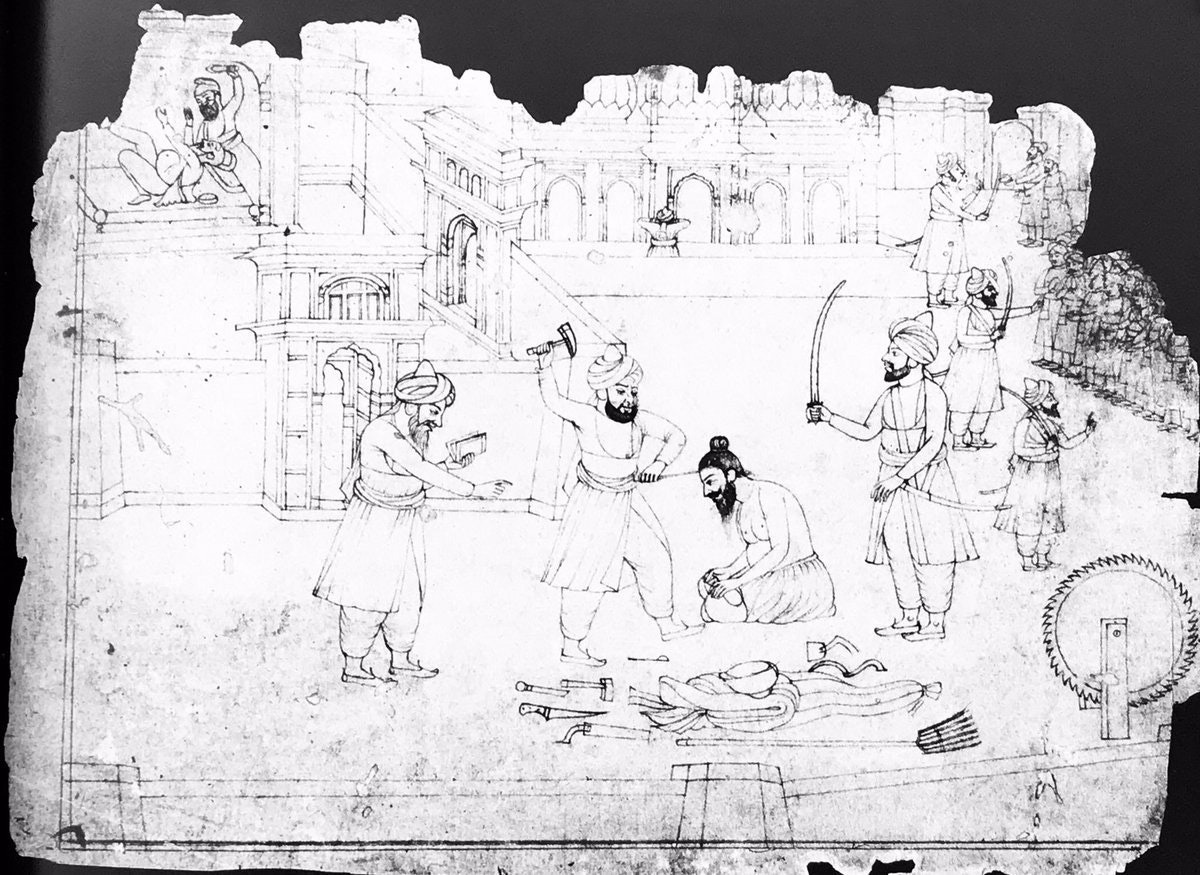Leaderboard
Popular Content
Showing content with the highest reputation on 07/18/2021 in all areas
-
As I thought this was some of the older bungey1 point
-
1 point
-
Birth Is disintegration of an integrated being in Physical plane- Body, Mind (ego, personality, not localized in brain, reside in every cell) and Soul. Death is integration- first recognition of that you were not the body. that you have no interest in your body after you die and you can exist without it. Next is purging emptying your earth belief systems ie experience dharamraj, hell etc other belief system has no mention of meeting jam doots or dharamraj. Most do have a life review to make them understand that since we are all one we were doing all bad or good to ourselves. Next mergence into GOD all is one feeling. Next go out of the mergence. Then go to spiritual plane all the Khands described in end of Japji Sahib to do Plan for next reincarnation. Then back to mergence in GOD. Followed by awareness and contiinuation of where your ego left off birth again to earth or many other planes. This is just my understanding.1 point
-
1 point
-
I do not follow anyone apart from Guru Granth Sahib Ji, I am not scared to look for answers if I am unsure, thats why I will post on here , its the point, if I am wrong the sangat will , teach me the correct way.1 point
-
These kanjar destroyed the original house where Guru Nanak Dev ji was born ... why are we allowing a double murderer Jagiro to be sitting and making shots at our history as well???1 point
-
Bigger culprits than SGPC are the Kar Sewa Babas who are destroying our history.1 point
-
Viewpoint: Why Sikhs celebrate kindness Published https://www.bbc.co.uk/news/world-asia-india-57817615 1 day ago Share IMAGE COPYRIGHTGETTY IMAGES image captionBaljinder Singh, 60, cleans shoes of devotees visiting a mosque in Punjab as a voluntary service Founded some 500 years ago in what is now India's Punjab region, Sikhism is the world's fifth-largest religion. But what makes its members habitual do-gooders? Author Jasreen Mayal Khanna writes on the tradition of selfless service ingrained in the community. Think of any scene of disaster and you'll find Sikh volunteers rallying to the site, feeding migrants, helping riot victims, and rebuilding homes after earthquakes. From the Rohingya crisis in Myanmar to the Paris terror attacks, the farmers' marches in India to the protests in America against George Floyd's killing, people from this 30 million-strong community worldwide have made it a tradition to help complete strangers in their darkest moments. Through the pandemic, they reached new heights. In Maharashtra in western India, a gurdwara (the Sikh place of worship) fed two million people in 10 weeks last year. Other gurdwaras in India melted the gold they had collected over the last 50 years to set up hospitals and medical colleges. Sikh NGOs set up "oxygen langars" - langars are the community kitchens in the gurdwaras - providing free oxygen to people as India gasped and reeled through its deadly second wave of coronavirus. The Sikh father and son who saved Muslims 'I'm divorced, so Sikh men don't want me' How did Sikhs become the Good Samaritans of the world? Most religions tell their followers to help others and to do good - but how have the Sikhs gone from talking to doing so effectively? It goes back to their founder Guru Nanak who preached that selfless service (seva as it is called) and hard work are as important as prayer. When Sikhs visit the gurdwara, they spend time in front of the holy book, giving thanks and praying, but they spend an equal amount of time helping cook and serve the langars or meals, looking after the devotees' shoes and cleaning the premises. IMAGE COPYRIGHTREUTERS image captionA Sikh volunteer checks a woman patient of Covid-19 in Delhi Sikh temples thus aren't just places of worship - they are soup kitchens and homeless shelters and community centres, a place to call home if you have none. By making seva the song of the Sikhs, Guru Nanak instilled service in their DNA. This is why Sikh vegetable vendor, Baljinder Singh, has spent every Friday afternoon for the last 40 years looking after the footwear of the Muslims praying in his local mosque in Punjab. "For me humanity is above any religion," he says. Studies say redirecting our focus from our own problems to helping others can do wonders for our mental health. Giving is associated with benefits - lower BP, lower mortality rates, better moods and higher markers of happiness. There's also something powerful and soothing about working by hand. Talk to pashmina yarn spinners or Japanese makeup brush producers, and they liken the painstaking work they do to a type of meditation. Take 97-year-old Nisharat Kaur Matharu who has been cooking for a homeless shelter in Southall, London, during the pandemic. Ms Matharu is at the age when she could put her feet up. But she believes as long as your hands and feet work, you should use them to serve others. The work is thus its own balm - a kind of meditation without the hard work of getting your mind to be still. Then there's the dancing Sikh Hasmeet Singh Chandok who was often mistaken to be Muslim in Nova Scotia where he lives. To spread awareness, he started making bhangra videos which went viral. Instead of becoming bitter, he helped others and found happiness himself. IMAGE COPYRIGHTGETTY IMAGES image captionSikhism is the world's fifth-largest religion The secret to being good is that it's actually a natural outcome of other behaviours and attitudes. Sikhs pray daily for two things. The first is "sarbat da bhalla" or the welfare of all and by doing this, they accept all beings as worthy. This is the root of seva and why gurdwaras are open to all. The second is eternal positivity - what they call "chardi kala". Sikhs chant these two words in every moment of life, when they visit the gurdwara, at weddings and celebrations and to each other when life deals them a blow. The motivation for doing seva, thus, is to find purposeful happiness in our life. Psychologists agree that we need two kinds of happiness to lead full lives. Hedonistic happiness depends on external factors such as compliments or purchases or travel and eudaimonic - a greek work for happiness or welfare - happiness comes from learning a new skill, spending time with family or doing community service. Sikhs are adept at incorporating bothDoes that mean all Sikhs are joyful and joy giving? Certainly not. The community has seen excesses, patriarchy, crime - and these problems are as widespread among Sikhs as their virtues are. For instance, drug abuse and drug-related crimes are far higher in Punjab compared to other Indian states according to the The Punjab Opioid Dependence Survey conducted in 2015. Sikhs are as flawed and as human as the rest of us and I don't want to argue that they are better than the rest of us. They aren't. However, the exhortations of their faith and their conditioning leads to a greater proportion of them doing good work than others. In Sikhism, doing good turns into a celebration and not a duty. This is its secret. This is why Chandok makes his wonderful videos. Or why the Sikhs at the Indian farmers' protests against the new farm bills fed the police. On the outside these acts of seva may look like grand selfless gestures but while practising them one experiences tranquillity and meaningful joy. It's a solution as extraordinary as it is simple. Jasreen Mayal Khanna is the author of Seva: Sikh Secrets on How to Be Good in the Real World1 point
-
1 point
-
All I'm going to say is that we seriously need to act on the SGPC. They have proven to be a bunch of incompetent, useless, administrators of our gurdwaras. Sangat needs to remove these guys and restore the Panj Pyare system.1 point
-
Shower with it on, once done remove 1 leg at time from existing kachera and place into new one1 point
-
Sikh and Hindu women just throw their religion in dustbin if they marry muslim man. But muslim women try their best to lure their husbands in islam.1 point
-
Gurfateh all, My name is Dr Jasjit Singh, Associate Professor at the University of Leeds.I have recently put together an online survey to examine how Sikhs engagewith Sikhi online. This survey is based on a similar survey which I ran aspart of my PhD. I am now re-running the survey to see what has changed over the past 10years, focusing on digital innovations and on the online space. Anyone whoself identifies as 'Sikh' is welcome to respond. The survey link is here: https://leeds.onlinesurveys.ac.uk/sikhsurvey I am looking for responses from Sikh living anywhere of any age. Pleasefeel free to disseminate to any relevant contacts. Many thanks, Jasjit.1 point
-
Little tip: read this bani before doing task you feel nervous for (public speaking, exams etc). It will make war ready and fearless lol. I think bhai jagraj from basics of sikhi used to read this bani before doing speakers corner/university talks1 point
-
1 point








